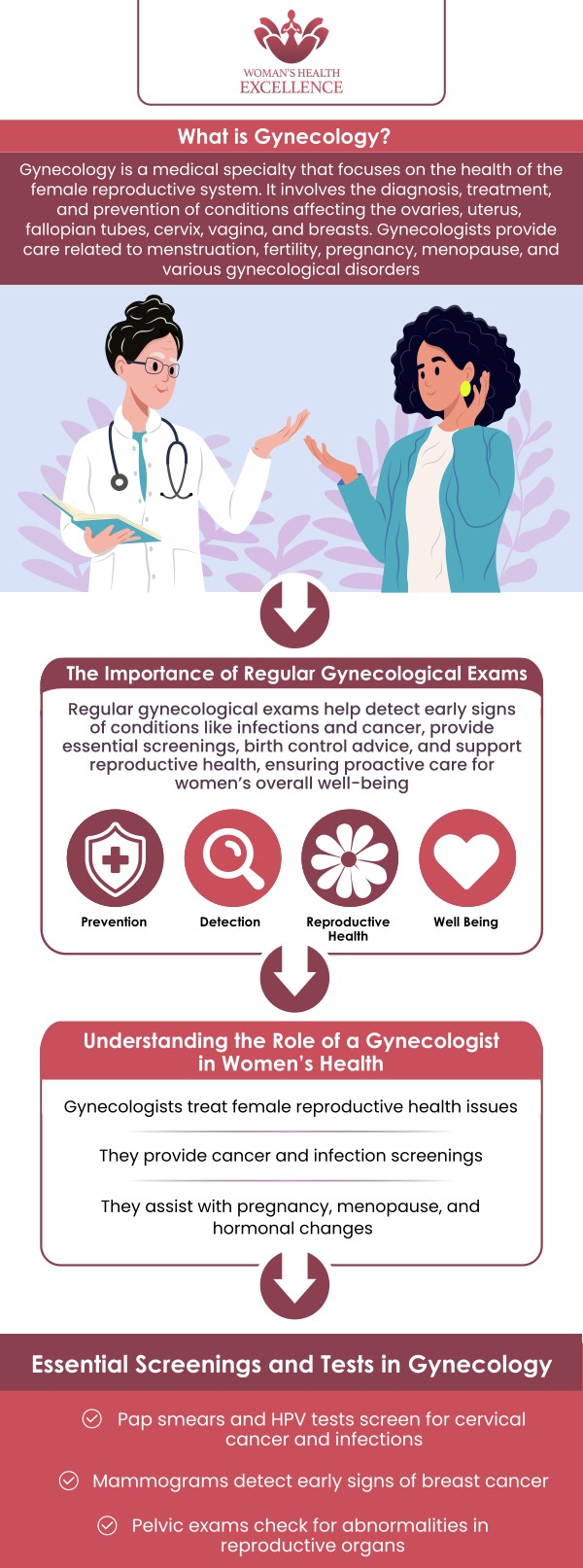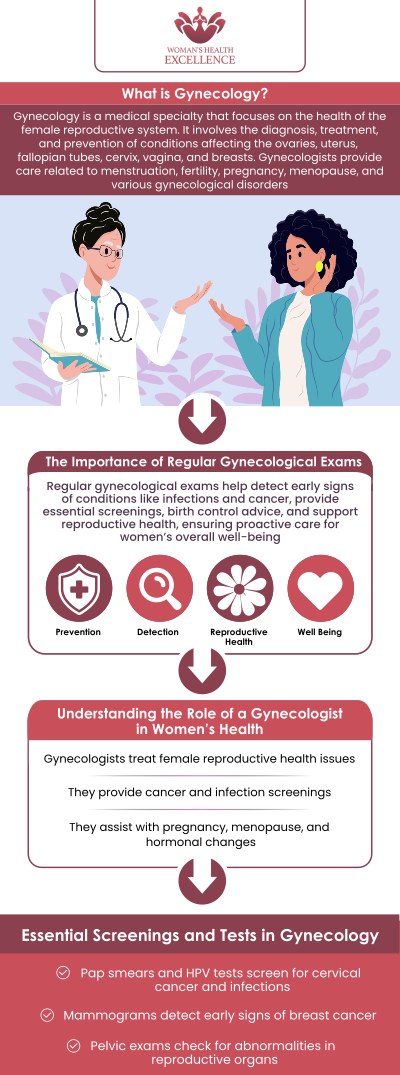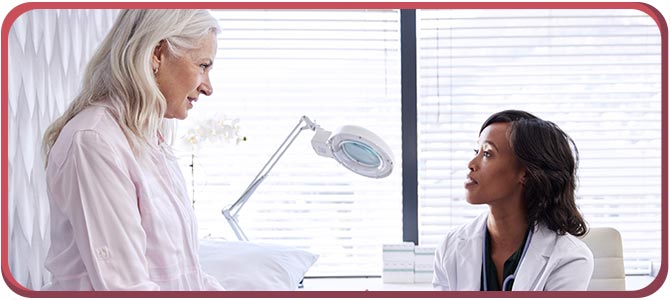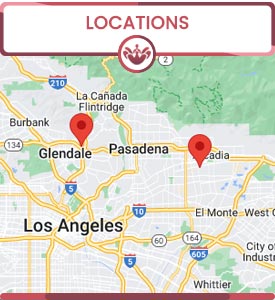What Does a Gynecologist Do?
Visiting a gynecologist can be beneficial for a variety of reasons such as routine examinations, birth control, fertility evaluation, pregnancy care, menstrual disorders, menopause management, sexual health, and reproductive counseling. Gynecologists are available as your primary doctor when it comes to your female anatomy and health. Meet Dr. Prema Kothandaraman at The Ob-Gyn and Incontinence Center. Contact us or book an appointment online with one of our gynecologists today. We have convenient locations to serve you in Arcadia, and Glendale, CA.




Table of Contents:
What type of diseases does a gynecologist treat?
What are the symptoms of gynecological diseases?
Why do I need a gynecologist?
When should a female see a gynecologist?
What are the benefits of visiting a gynecologist?
Gynecologists provide reproductive and sexual health services to their patients which can include a variety of services like pelvic exams, pap smear tests, cancer screenings, as well as testing and treatment for vaginal infections. Gynecologists also diagnose and treat reproductive system disorders and treat diseases including:
● Bladder Incontinence
● Cervical Cancer
● Cervical Insufficiency
● Congenital Abnormalities
● Egg Freezing
● Endometriosis
● Uterine Cancer
● Fecal Incontinence
● Fibroids
● Fallopian Tube Cancer
● Hirsutism
● Infertility
● Menopause
● Oncofertility
● Ovarian Cancer
● Ovarian Cysts
● Pelvic Floor Disorders
● Polycystic Ovary Syndrome
● Premenstrual Syndrome
● Prolapse
● Pelvic Pain
● Recurrent Pregnancy Loss
● Reproductive Surgery
● Sexually-Transmitted Disease
● Urinary Incontinence
● Urinary Tract Infection
● Endometrial Cancer
● Vaginal Yeast Infection
● Vaginal Cancer
● Vulvodynia
● Bladder Incontinence
• Urine leakage during activities that you would normally do including bending, lifting, coughing, and exercising
• Strong and sudden urge to urinate, a feeling like you may not be able to make it to the bathroom on time
• No warning signs before you end up having urine leakage
• Bed-wetting
● Cervical Cancer
• Spotting blood, light bleeding either between or following a period
• Menstrual bleeding that lasts longer or is much heavier than usual
• Bleeding either after douching, after intercourse, or during a pelvic exam
• Vaginal discharge increases
• Pain during sexual intercourse
• Bleeding after menopause
• Persistent and unexplained pelvic and/or back pain
● Cervical Insufficiency
• Pelvic pressure
• Premenstrual type cramping
• Braxton-hicks’ contractions
• Back pain
• Vaginal discharge that often increases in volume or wetness
• Vaginal discharge that is clear, white, or colored either light yellow, pink, or tan
• Spotting
• Stomach pain
• Bloating
• Nausea
• Diarrhea
• Vomiting
● Endometriosis
• Pain (similar to menstrual pain)
• Pain during intercourse
• Abnormal bleeding or heavy menstrual flow
• Infertility
• Pain during urination while on a menstrual period
• Pain during a bowel movement while on a menstrual period
• Other gastrointestinal issues include constipation, diarrhea, and/or nausea
● Uterine Cancer
• Bleeding that occurs between periods before menopause
• Bleeding or spotting post menopause
• Lower stomach pain or cramping within the pelvis
• Thin white or even clear vaginal discharge during post menopause
• Extremely prolonged, frequent, and heavy vaginal bleeding (particularly when you are over the age of 40)
● Fecal Incontinence
• Diarrhea
• Bloating
• Gas
• Issues passing a bowel movement or irregular bowel movements
● Fibroids
• Prolonged or heavy periods
• Bleeding between your periods
• Stomach fullness and/or discomfort
• Pelvic pain
• Lower back pain
• Bladder issues
• Constipation
• Excessive straining
• Infertility
• Complications during pregnancy
• Pain during intercourse
● Fallopian Tube Cancer
• Stomach bloating
• Stomach or pelvic pain
• Urinary symptoms
• Fatigue
• Ingestion
• Back pain
• Pain with intercourse
• Constipation
• Menstrual irregularities
• Swelling within the stomach or pelvic
• Vaginal discharge (white, clear, or blood-tinged)
● Infertility
• Bleeding that is heavier or lighter than normal
• Periods that are irregular
• No periods at all
• Painful periods
● Menopause
• Irregular periods
• Vaginal dryness
• Hot flashes
• Chills
• Night sweats
• Sleep issues
• Mood changes
• Weight gain
• Slowed metabolism
• Dry skin
• Thinning hair
• Breast fullness is lost
● Ovarian Cancer
• Stomach swelling or bloating
• Feeling of being too full when eating quickly
• Weight loss
• Discomfort during the pelvic area
• Fatigue
• Back pain
• Bowel habit changes
• Frequent urination
● Ovarian Cysts
• Pelvic pain
• Pain during intercourse
• Issues emptying your bowels
• Frequent urination
• Irregular periods
• Swollen stomach or bloating
• Feeling of being full
● Pelvic Floor
• Urinary problems
• Constipation
• Lower back pain
• Pain in the genitals, pelvic, and rectum
• Uncomfortable during sexual intercourse for women
• Pressure within the pelvic region or rectum
• Muscle spasms occurring in the pelvis
● Polycystic Ovary Syndrome
• Missed periods
• Irregular periods
• Very light periods
• Cysts on the ovaries
• Excessive body hair
• Weight gain (particularly around the stomach)
• Acne
• Oily skin
• Male-pattern baldness
• Thinning hair
• Infertility
• Skin tags on the neck or armpits
• Dark or thick skin patches located on the armpits, back of the neck, or under the breasts
● Premenstrual Syndrome
• Fatigue
• Mood swings
• Anxiety
• Tension
• Depressed
• Crying more often
• Irritable
• Food cravings
• Insomnia
• Social withdrawal
• Poor concentration
• Lower libido
• Cramps
• Headache
• Muscle pain
• Weight gain
• Bloating
• Tender breasts
• Acne flare-up
• Constipation or diarrhea
● Prolapse
• Pressure within the pelvic area
• Lower back pain
• Painful intercourse
• Feeling like something is falling out of your vagina
• Urinary issues
• Constipation
• Spotting or bleeding from the vagina, not during your menstrual time
● Pelvic Pain
• Menstrual cramping
• Menstrual pain
• Bleeding, spotting, or discharge from the vagina
• Painful or issues urinating
• Constipation or diarrhea
• Gas or bloating
• Bowel movements with blood
• Pain during intercourse
• Fever or chills
• Pain within the hips
• Pain within the groin
● Recurrent Pregnancy Loss
• Two or more pregnancy losses (clinically recognized pregnancy that involuntarily ends before 20 weeks)
● Sexually-Transmitted Disease
• Sores on the genitals, rectal, or oral areas
• Bumps on the genitals, rectal, or oral areas
• Painful urination
• Burning sensation during urination
• Discharge from the penis
• Odorous or unusual vaginal discharge
• Pain during intercourse
• Swollen and sore lymph nodes, notably within the groin area
• Lower stomach pain
• Fever
• Rash on the hands, feet, or trunk
● Urinary Incontinence
• Urinary leakage
• Sudden and strong urge to urinate
• Urinary leakage without warning or signs
• Bed-wetting
● Urinary Tract Infection
• Persistent and strong urge to urinate
• Burning when urinating
• Small amounts of frequent urine
• Urine looks cloudy
• Urine has a red, bright pink, or cola-color to it indicating blood is present
• Strong-smelling urine
• Pelvic pain (particularly in women)
● Endometrial Cancer
• Discharge or bleeding occurring that is not in relation to your menstruation
• Postmenopausal bleeding
• Painful or issues urinating
• Painful intercourse
• Pain within the pelvic area
● Vaginal Yeast Infection
• Itching in the vagina area
• Irritation in the vagina area
• Swelling and redness of the vulva
• Vaginal rash
• Pain and soreness within the vagina
• White, thick, odor-free vaginal discharge that may appear to look like cottage cheese
• Watery vaginal discharge
● Vaginal Cancer
• Discharge and bleeding not associated with your menstrual period
• Pain during intercourse
• Pain within the pelvic area
• Lump found in the vagina
• Pain during urination
• Constipation
● Vulvodynia
• Burning
• Sore
• Stinging
• Raw
• Painful intercourse
• Throbbing
• Itching
Regular visits to your gynecologist are highly recommended to any woman, particularly for your annual screening. This is largely due to the fact you can bring up any concerns or symptoms that may be occurring in regards to your pelvic, vaginal, vulvar area, pain, or abnormal bleeding from the uterus.
Women should be visiting their gynecologist for a pap screening for cervical cancer starting at the age of 21. However, it is highly recommended to start visiting a gynecologist much earlier on, usually around the age of 13 to 16, particularly during your time of transition from child to young women, menstruation, or if you are becoming sexually active.
You should also book an appointment with a gynecologist if you are noticing any symptoms from the list above, or if you are noticing any pain that may be concerning.
Gynecologists are available for not only your general health care, but also for preventative medicine for women and to help diagnose and treat any medical issues which may include lower back pain, headaches, mood changes, and acne. For more information, call or book an appointment online with our gynecologist, or visit our clinic. We have convenient locations to serve you. We look forward to serving you! We look forward to serving you! We serve patients from Arcadia CA, Glendale CA, Monrovia CA, Pasadena CA, Los Angeles CA, Burbank CA and surrounding areas.


Additional Services You May Need
▸ Urogynecology
▸ Minimally Invasive Gynecology
▸ Monalisa & Medical Aesthetics
▸ Bioidentical Hormone Replacement Therapy
▸ Urinary Incontinence
▸ Pelvic Organ Prolapse
▸ Painful Bladder
▸ Urinary Tract Infection
▸ Genitourinary Syndrome of Menopause
▸ Female Sexual Dysfunction
▸ Urinary Retention
▸ Vaginal Laxity & Prolapse
▸ Postpartum Pelvic Floor Problems
▸ PCOD
▸ Bladder Prolapse Repair
▸ Urgent PC
▸ Fibroids
▸ Excessive Bleeding
▸ Pelvic Pain
▸ Birth Control & IUD
▸ Vaginal & Pelvic Infection
▸ Monalisa Touch
▸ STD
▸ TempsureVitalia
▸ Biote Pellet Therapy
▸ Topical BHRT
▸ Flexsure
▸ Rectal Prolapse Repair
▸ Tempsure ENVI
▸ Minimally Invasive Pelvic Surgery for Incontinence



